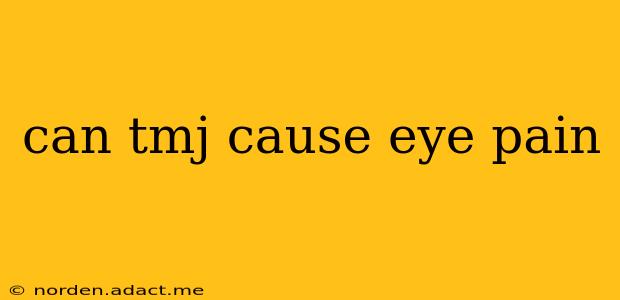Can TMJ Cause Eye Pain? Understanding the Connection
Temporomandibular joint (TMJ) disorders affect the jaw joint and the muscles controlling chewing. While the jaw is far from the eyes, many sufferers report experiencing eye pain alongside their jaw pain. This raises the crucial question: can TMJ actually cause eye pain? The short answer is yes, but the relationship isn't always straightforward. Let's explore the connection in detail.
How Can TMJ Lead to Eye Pain?
The link between TMJ and eye pain isn't direct nerve connection but rather a complex interplay of factors. Here's a breakdown:
-
Referred Pain: This is the most common explanation. Referred pain occurs when pain originating in one area of the body is felt in another. The trigeminal nerve, responsible for sensation in the face, including the jaw and the eye area, is implicated here. Irritation or dysfunction in the TMJ can trigger pain signals along this nerve, resulting in pain being felt not only in the jaw but also in the eye or surrounding areas, such as the temple or forehead.
-
Muscle Tension: TMJ disorders often involve significant muscle tension in the jaw, face, and neck. This tension can radiate upwards, causing headaches and eye strain. The muscles surrounding the eyes can become tight and tender, contributing to eye pain, particularly when combined with prolonged screen time or other visually demanding activities.
-
Postural Issues: Problems with posture, often associated with TMJ, can lead to strain on the neck and upper back. This strain can then affect the muscles around the eyes, causing pain and discomfort.
-
Stress and Anxiety: TMJ disorders are often exacerbated by stress and anxiety. These factors can contribute to muscle tension throughout the body, including the facial muscles, potentially leading to eye pain.
What are the Symptoms of TMJ-Related Eye Pain?
Eye pain associated with TMJ is often described as:
- A dull ache or throbbing: This is often present around the eye, temple, or forehead.
- Pressure or tightness: A feeling of pressure behind the eyes is common.
- Sensitivity to light (photophobia): Bright light can worsen the pain.
- Eye strain or fatigue: This is especially noticeable after prolonged visual activities.
- Headaches: TMJ-related eye pain often accompanies headaches, particularly tension headaches.
Does TMJ Always Cause Eye Pain?
No, not everyone with TMJ experiences eye pain. The presence of eye pain alongside jaw pain may vary in severity and frequency, and many individuals with TMJ disorders don't experience eye pain at all. The interplay of factors described above must be present for eye pain to manifest.
How is TMJ-Related Eye Pain Diagnosed?
Diagnosing TMJ-related eye pain requires a thorough examination by a healthcare professional. This will typically involve a physical examination of the jaw, palpation of the facial muscles, and a review of the patient’s medical history. Imaging techniques like X-rays or MRIs might be used to rule out other conditions. A comprehensive assessment is vital to differentiate TMJ-related eye pain from other causes of eye pain, such as migraines, sinus infections, or eye strain.
What are the Treatment Options for TMJ-Related Eye Pain?
Treatment for TMJ-related eye pain focuses on managing the underlying TMJ disorder. Options may include:
- Pain relievers: Over-the-counter medications like ibuprofen or naproxen can help relieve pain and inflammation.
- Muscle relaxants: These can help reduce muscle tension in the jaw and surrounding areas.
- Physical therapy: Exercises and stretches can help improve jaw mobility and reduce muscle tension.
- Splints or bite guards: These devices can help reposition the jaw and reduce strain on the TMJ.
- Stress management techniques: Relaxation techniques like yoga, meditation, or deep breathing can help reduce stress and muscle tension.
If you are experiencing eye pain and suspect it may be related to TMJ, it’s crucial to consult a doctor or dentist specializing in TMJ disorders for accurate diagnosis and treatment. They can help determine the underlying cause of your eye pain and develop a personalized treatment plan to alleviate your symptoms.
